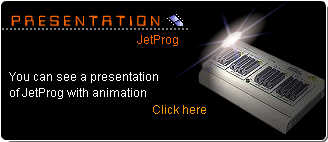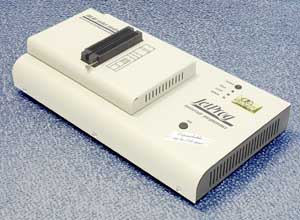JetProg
Discontinued product. Replacement: BeeProg2 / BeeProg2C.
Universal, extremely fast programmer, capable of multiprogramming and ISP.
Short description:
- extremely fast programming
- 48-pins powerful pindrivers
- DIL48 ZIF socket module in base configuration, no adapter required for any DIL devices
- multiprogramming capability for many of supported devices
- in-circuit programming (ISP) capability for many of supported devices
- connection to PC - parallel (printer) port
- high-speed IEEE 1284 printer-port interface, capable to reach 1MB/sec transfer rate
- comfortable and easy to use control program, Windows 95/98/Me/NT/2000/XP compatible
- made in Slovakia
- warranty - 3 years
- approved by CE laboratory to meet CE requirements

Multimedia presentation

Size: 217 kB
Scheme of JetProg programming system
 |
|
| ||||||||
 | 
| |||||||||
 | ||||||||||
Base configuration (as shown at the scheme):
- JetProg, base unit
- JetProg, DIL48 socket module
Optional accesories:
- socket converters for devices up to 48 pins
- multisocket modules for JetProg - Multiprogramming system
- special modules (ISP/JTAG)
Features
General
- New generation of Windows 95/98/ME/NT/2000/XP based Elnec universal programmers built to meet the rigorous demands of the leading engineers and programming centers.
- Supports all kinds of types and silicon technologies of today and tomorrow programmable devices without family-specific module. You have freedom to choose the optimum device for your design. JetProg isn't only programmer, but also tester of TTL/CMOS logic ICs and memories. Furthermore, it allows to generate user-definable test pattern sequences.
- Provides very competitive price with excellent hardware design for reliable programming. Great "value for money" in this class.
- Very fast programming due to high-speed FPGA driven hardware and support of ECP/EPP (IEEE1284) parallel port.
- JetProg interfaces with the IBM PC 486 compatible or higher, portable or desktop personal computers through any standard parallel (printer) port (no special interface card needed). Programmer also supports IEEE1284 (ECP/EPP) high-speed parallel port.
Hardware
- 48 powerful pindrivers in base unit. Advanced pin drivers incorporate high-quality high-speed circuitry to deliver programming and testing performance without overshoot or ground bounce for all device technologies. Pin drivers operate down to 1.8V so you'll be ready to program the full range of today's advanced low-voltage devices.
- Modular design of JetProg allows to adapt the programmer according to customer's needs either as very flexible universal programmer for laboratory or high efficient multiprogrammer in production line. Multiprogramming capability for most of supported devices is accomplished by using "multiple-socket" modules.
- The programmer performs device insertion test (wrong or backward position) and contact check (poor contact pin-to-socket) before it programs each device. These capabilities, supported by overcurrent protection and signature-byte check help prevent chip damage due to operator error.
- Built-in protection circuits eliminate damage of programmer and/or programmed device due to environment or operator failure. All the inputs of the JetProg programmer, including the ZIF socket, connection to PC and power supply input, are protected against ESD up to 15kV.
- JetProg programmer performs programming verification at the marginal level of supply voltage, which, obviously, improves programming yield, and guarantees long data retention.
- Various socket converters are available to handle device in PLCC, SOIC, PSOP, SSOP, TSOP, TSSOP, TQFP, QFN (MLF), SDIP, BGA and other packages.
Software
- Programmer is driven by an easy-to-use control program with pull-down menu, hot keys and on-line help. Selecting of device is performed by its class, by manufacturer or simply by typing a fragment of vendor name and/or part number.
- Standard device-related commands (read, blank check, program, verify, erase) are boosted by some test functions (insertion test, signature-byte check), and some special functions (autoincrement, production mode - start immediately after insertion of chip into socket).
- All known data formats are supported. Automatic file format detection and conversion during loading of file.
- The rich-featured auto-increment function enables one to assign individual serial numbers to each programmed device - or simply increments a serial number, or the function enables one to read serial numbers or any programmed device identification signatures from a file.
- The software also provide a many information about programmed device. As a special, the drawing of all available packages are provided. The software provide also explanation of chip labelling (the meaning of prefixes and suffixes at the chips) for each supported chip.
- The software provide a full information for ISP implementation: Description of ISP connector pins for currently selected chip, recommended target design around in-circuit programmed chip and other necessary information.
- The remote control feature allows to be PG4UW software flow controlled by other application – either using .BAT file commands or using DLL file.
- Jam files of JEDEC standard JESD-71 are interpreted by Jam Player. Jam files are generated by design software which is provided by manufacturer of respective programmable device. Chips are programmer in-ZIF or through ISP connector (IEEE 1149.1 Joint Test Action Group (JTAG) interface).
- VME files are interpreted by VME Player. VME file is a compressed binary variation of SVF file and contains high-level IEEE 1149.1 bus operations. VME files are generated by design software which is provided by manufacturer of respective programmable device. Chips are programmer in-ZIF or through ISP connector (IEEE 1149.1 Joint Test Action Group (JTAG) interface).
- Multiple devices are possible to program and test via JTAG chain: JTAG chain (ISP-Jam) or JTAG chain (ISP-VME).
Care for the customers
- It is important to remember, that a support most of the new devices requires only a software update due to the JetProg is truly universal programmer. With our prompt service you can have new device added to the list of supported devices within hours! See AlgOR (Algorithm On Request) service for details.
- Free software updates are available by download from our WEB site.
- Keep-Current and AlgOR services, our next step towards customer satisfaction.
- Keep-Current service means, that Elnec ships the latest version of programmer software and and updated user documentation (Keep-Current package) to customer . The Keep-Current service is your hassle-free guarantee that you are achieving the highest quality programming on Elnec programmers, at minimal cost.
- AlgOR (Algorithm On Request) service gives the user a tool to influence amount and types of programmed devices as needed.
- Advanced design of the JetProg programmer, including protective circuits, original brand components, and careful manufacturing and burning allows us to provide a three-year warranty on parts and labor for the programmer (limited 25 000-cycle warranty on ZIF sockets).
Hardware specification
Base unit, DACs
- FPGA based IEEE 1284 slave printer port, up to 1MB/s transfer rate
- on-board powerful microprocessor (20MHz) supported by FPGA based state machine, 20MHz powered
- three D/A converters for VCCP, VPP1, and VPP2, controllable rise and fall time
- VCCP range 0..8V/1A
- VPP1, VPP2 range 0..26V/1A
- autocalibration
- selftest capability
- protection against surge and ESD on power supply input, parallel port connection
- banana jack for ESD wrist straps
Socket, pindriver
- pindrivers: 48
- 1x VCC, 2x VPP can be connected to each pin
- perfect ground for each pin
- FPGA based TTL driver provides H, L, CLK, pull-up, pull-down on all pindriver pins
- analog pindriver output level selectable from 1.8 V up to 26V
- current limitation, overcurrent shutdown, power failure shutdown
- ESD protection on each pin of socket (IEC1000-4-2: 15kV air, 8kV contact)
- continuity test: each pin is tested before every programming operation
Socket, base configuration
- 48-pin DIL ZIF (Zero Insertion Force) socket accepts both 300/600 mil devices up to 48 pins
Software
- Algorithms: only manufacturer approved or certified algorithms are used. Custom algorithms are available at additional cost.
- Algorithm updates: software updates are available approx. every 2 weeks, free of charge.
- Main features: revision history, session logging, on-line help, device and algorithm information.
Device operations
- standard:
- intelligent device selection by device type, manufacturer or typed fragment of part name
- automatic ID-based selection of EPROM/Flash EPROM
- blank check, read, verify
- program
- erase
- configuration and security bit program
- illegal bit test
- checksum
- interprete the Jam Standard Test and Programming Language (STAPL), JEDEC standard JESD-71
- interprete the VME files compressed binary variation of SVF files
- security:
- insertion test, reverse insertion check
- contact check
- ID byte check
- special:
- production mode (automatic start immediately after device insertion)
- auto device serial number increment
- statistic
- count-down mode
Buffer operations
- view/edit, find/replace
- fill/copy, move, byte swap, word/dword split
- checksum (byte, word)
File load/save
- no download time because programmer is PC controlled
- automatic file type identification
Supported file formats- unformatted (raw) binary
- HEX: Intel, Intel EXT, Motorola S-record, MOS, Exormax, Tektronix, ASCII-SPACE-HEX
- Altera POF, JEDEC (ver. 3.0.A), eg. from ABEL, CUPL, PALASM, TANGO PLD, OrCAD PLD, PLD Designer ISDATA, etc.
- JAM (JEDEC STAPL Format), JBC (Jam STAPL Byte Code), STAPL (STAPL File) JEDEC standard JESD-71
- VME (ispVME file VME2.0/VME3.0)
Device support
Programmer:
- EPROM: NMOS/CMOS, 2708*, 27xxx and 27Cxxx series, with 8/16 bit data width, full support for LV series
- EEPROM: NMOS/CMOS, 28xxx, 28Cxxx, 27EExxx series, with 8/16 bit data width
- Flash EPROM: 28Fxxx, 29Cxxx, 29Fxxx, 29BVxxx, 29LVxxx, 29Wxxx, 49Fxxx series, from 256Kbit to 32Mbit, with 8/16 bit data width, full support for LV series
- Serial E(E)PROM: 24Cxxx, 24Fxxx, 25Cxxx, 45Dxxx, 59Cxxx, 25Fxxx, 25Pxxx, 85xxx, 93Cxxx, NVM3060, MDAxxx series, full support for LV series
- Configuration (EE)PROM: XCFxxx, XC17xxxx, XC18Vxxx, EPCxxx, AT17xxx, 37LVxx
- 1-Wire E(E)PROM: DS1xxx, DS2xxx
- PROM: AMD, Harris, National, Philips/Signetics, Tesla, TI
- NV RAM: Dallas DSxxx, SGS/Inmos MKxxx, SIMTEK STKxxx, XICOR 2xxx, ZMD U63x series
- PLD: Altera: MAX 3000A, MAX 7000A, MAX 7000B, MAX 7000S, MAX7000AE
- PLD: Lattice: ispGAL22V10x, ispLSI1xxx, ispLSI1xxxEA, ispLSI2xxx, ispLSI2xxxA, ispLSI2xxxE, ispLSI2xxxV, ispLSI2xxxVE, ispLSI2xxxVL, LC4xxxB/C/V/ZC, M4-xx/xx, M4A3-xx/xx, M4A5-xx/xx, M4LV-xx/xx
- PLD: Xilinx: XC9500, XC9500XL, XC9500XV, CoolRunner XPLA3, CoolRunner-II
- other PLD: SPLD/CPLD series: AMI, Atmel, AMD-Vantis, Gould, Cypress, ICT, Lattice, NS, Philips, STM, VLSI, TI
- Microcontrollers 48 series: 87x41, 87x42, 87x48, 87x49, 87x50 series
- Microcontrollers 51 series: 87xx, 87Cxxx, 87LVxx, 89Cxxx, 89Sxxx, 89LVxxx, all manufacturers, Philips 87C748..752 series, Philips LPC series, Cygnal/Silicon Laborat. C8051 series
- Microcontrollers Intel 196 series: 87C196 KB/KC/KD/KT/KR/...
- Microcontrollers Atmel AVR: AT90Sxxxx, ATtiny, ATmega series
- Microcontrollers Cypress: CY8Cxxxxx
- Microcontrollers ELAN: EM78Pxxx
- Microcontrollers Microchip PICmicro: PIC10xxx, PIC12xxx, PIC16xxx, PIC17Cxxx, PIC18xxx, dsPIC series
- Microcontrollers Motorola: 68HC05, 68HC08, 68HC11 series
- Microcontrollers National: COP8xxx series
- Microcontrollers NEC: uPD78Pxxx series
- Microcontrollers Scenix (Ubicom): SXxxx series
- Microcontrollers SGS-Thomson: ST6xx, ST7xx, ST10xx series
- Microcontrollers TI: MSP430 and MSC121x series
- Microcontrollers ZILOG: Z86/Z89xxx and Z8xxx series
- Microcontrollers other: EM Microelectronic, Fujitsu, Goal Semiconductor, Princeton, Macronix, Winbond, Hitachi, Holtek, Infineon(Siemens), NEC, Samsung, Toshiba, ...
Notes:
- devices marked * are obsolete, programming with additional module
- for all supported devices see actual DEVICE LIST
I.C. Tester:
- TTL type: 54,74 S/LS/ALS/H/HC/HCT series
- CMOS type: 4000, 4500 series
- Static RAM: 6116 .. 624000
- User definable test pattern generation
Package support:
- package support includes DIP, PLCC, SOIC, PSOP, SSOP, TSOP, TSSOP, TQFP, QFN (MLF), SDIP, BGA and other
- support all devices in DIP with default socket
- support devices in non-DIP packages up to 48 pins with universal adapters
- programmer is compatible with third-party adapters for non-DIP support
Programming speed
Note: The programming times of the programmer, attached to PC through LPT port, depends a bit on PC speed, LPT port type and operating system free resources. Look at Elnec programmers, tips to increase of programming speed application note for details.
| Device | Operation | Time | ||
|---|---|---|---|---|
| 27C010 | programming and verify | 21 sec. | ||
| AT29C040A | programming and verify | 31 sec. | ||
| AM29F040 | programming and verify | 35 sec. | ||
| PIC16C67 | programming and verify | 10 sec. | ||
| PIC18F452 | programming and verify | 4 sec. | ||
| Conditions: P4, 2.4 GHz, ECP, Windows XP. | ||||
General
PC system requirements
- Common, software related requirements
- Programmer hardware related requirements:
- one (parallel) printer port with nothing attached, the IEEE 1284 compatible printer port (ECP/EPP) on PCI bus recommended
Note: For convenience, we suggest that you use a supplementary multi I/O card to provide an additional printer port (LPT2 for example), in order to avoid sharing the same LPT port between printer and programmer.
Operation
- operating voltage 12..15V AC, max. 1A or 15V..18V DC, max. 1A
- power consumption max. 12W active, about 2.5W sleep
- dimensions 275x157x58 mm (10.8x6.2x2.3 inch)
- weight (without external adapter) 1.8kg (3.96828 lb)
- temperature 5°C ÷ 40°C (41°F ÷ 104°F)
- humidity 20%..80%, non condensing
Base configuration package includes
- JetProg, base unit
- JetProg, DIL48 socket module
- switching power adapter 100..240V AC/15V DC/1A
- connection cable PC-programmer
- diagnostic POD for selftest of the programmer
- anti-dust cover for ZIF socket
- user manual (on CD)
- software
- registration card
- transport case
Additional services
- Keep Current - Elnec sends to user the latest version of programmer software and updated user documentation (Keep-Current package)
- AlgOR (Algorithms On Request) - add new supported devices at the customer's request
Programmer price also includes
- free technical support (WebForm/e-mail based)
- free life-time software update via Internet
Accessories (optional)
JetProg - Multiprogramming modules
JetProg - Multiprogramming system DescriptionSpecial modules:
ISP module
Short description
- provide in-circuit programming (ISP) capability for JetProg programmer
- supports all standard ISP-programmable chips (Microcontrollers, PLD)
- JAM support for PLD
- module can provide a power supply for the target system
- ISP cable, ISP diagnostic POD and software included
- true low voltage support down to 1.8V
- serialization available

General
- ISP module attached to JetProg programmer is manual operated ISP programming solution, suitable for development and low/middle volume production application.
- This ISP programming solution provides very competitive price but excellent hardware design for reliable programming.
Hardware
- Optimized advanced pindriver deliver programming performance without overshoot or ground bounce for all device technologies. Pin drivers operate down to 1.8V so you'll be ready to program the full range of today's advanced low- voltage devices.
- The ISP programming solution performs programming verification at the marginal level of supply voltage, which, obviously, improves programming yield, and guarantees long data retention.
- ISP module provide also the power supply for the target system.
Software
- The ISP module is driven by the same software as the JetProg - Multiprogramming system Description programmer.
- The software provide a full information for ISP implementation: Description of ISP connector pins for currently selected chip, recommended target design around in-circuit programmed chip and other necessary information.
Device support
- Serial E(E)PROM: IIC series
- Microcontrollers Atmel: AT89Sxxx, AT90Sxxxx, ATtiny, ATmega series
- Microcontrollers Cypress: CY8C2xxxx
- Microcontrollers Elan: EM78Pxxx
- Microcontrollers EM Microelectronic: 4 and 8 bit series
- Microcontrollers Microchip PICmicro: PIC10xxx, PIC12xxx, PIC16xxx, PIC17xxx, PIC18xxx, dsPIC series
- Microcontrollers Motorola/Freescale: HC08 GT, LJ, QY, QT series
- Microcontrollers Philips: LPC series
- MMicrocontrollers TI: MSP430
- PLD: Lattice: ispGAL22xV10x, ispLSI1xxxEA, ispLSI2xxxE, ispLSI2xxxV, ispLSI2xxxVE, ispLSI2xxxVL, M4-xx/xx, M4LV-xx/xx, M4A3-xx/xx, M4A5-xx/xx, LC4xxxB/C/V/ZC
- Various PLD (also by Jam player/JTAG support):
Altera: MAX 3000A, MAX 7000A, MAX 7000B, MAX 7000S, MAX 9000, MAX II
Xilinx: XC9500, XC9500XL, XC9500XV, CoolRunner XPLA3, CoolRunner-II
ISP connector
- 14-pin male type with missinsertion lock
- 6 TTL pindrivers, provides H, L, CLK, pull-up, pull-down; level H selectable from 1.8V up to 5V to handle all (low-voltage including) devices.
- 1x VCCP voltage (range 2V..7V/100mA) and 2x VPP voltage (range 2V..25V/50mA)
- programmed chip voltage (VCCP) with both source/sink capability and voltage sense
- target system supply voltage (range 2V..15V/300mA)
- ESD protection on each pin of socket (IEC1000-4-2: 15kV air, 8kV contact)
DOS version of SW for programmers has been discontinued since 7/2003.
The information in this document is subject to change without notice.






